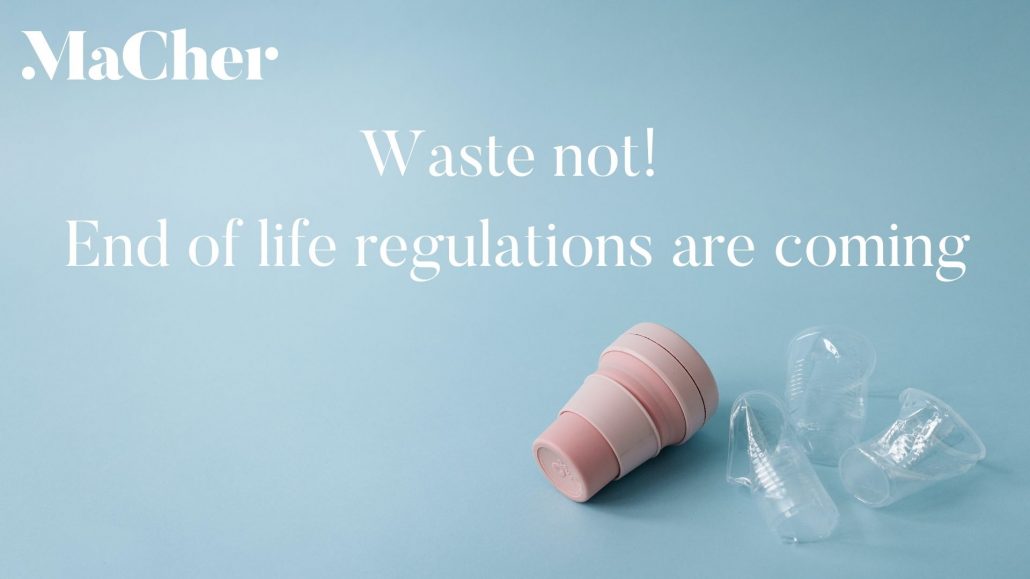Have you ever stood in front of a combined trash and recycling can and felt overwhelmed at the choice of options?
For a long time, it’s been up to consumers to deal with a product that we don’t need or want any more. But even that is fraught with challenge. A recycling symbol doesn’t actually mean that a product is recyclable! Nope, you read that right. Those three little arrows just identify the type of plastic. Last year, California even banned the use of the recycling logo on products that can’t be recycled.
But even if we are able to fathom whether something is trash vs. recycling, the system still might not work. Recycling is usually a local issue. Towns and municipalities have different policies and might not even be a place to process it!
The United Nations Environment Program, estimates that only 9 percent of all plastics ever manufactured has been recycled. The rest ends up in landfills, in nature or gets burned which releases nasty pollution into the air. That is only plastics. In 2018, the EPA found that per person, the US produces 4.9 pounds of waste per day.
But times are changing…
Consumers want change
Consumers are becoming more aware of waste. More zero-waste stores are cropping up and less packaging has become a positive selling feature. Last year, MaCher’s research with Compose[d], a digital creative services agency and fellow B Corp, found that 84% of Americans said it was important to buy sustainable products and 43% would pay more for reusable products.
Industry is embracing change
So much of the packaging covering what we buy has no secondary use. Plastic hangars, polythene bags, the little plastic strings that attach price tags to clothes, the little jars, tubes, caps and pumps from our beauty products…almost all of it goes straight to the trash.
Some industries are fortunately starting to act:
- In beauty, together with many other brands, MaCher has joined the Pact Collective to help make beauty packaging more sustainable. We’re supporting the Pact Collective to educate and move the industry towards using refillable options and packaging designed for reuse or recyclability.
- The B Beauty Coalition, a group of Certified B Corps in the Beauty industry are also looking to collectively address problems of unsustainable packaging.
- In fashion, organizations like the ZWDO Collective and The Sustainable Fashion Collective are sharing their knowledge, expertise and enthusiasm of zero-waste design.
- Outside of fashion, the IKEA Foundation is also on board and in 2021 sponsored a global challenge for zero-waste ideas. Check out the 16 winners from around the world who are now working to scale their ideas.
Governments are stepping in to make change happen faster
As mountains of waste continue to grow and consumer and industry behaviour change isn’t happening at the scale we need, in step the governments. They cannot afford to process all the waste. Watch out companies, Extended Producer Responsibility (EPR) rules are coming your way!
End-of-life regulation is coming for fashion and beauty
EPR makes the manufacturer of the product responsible for the entire lifecycle of the product. The regulation gets them to focus on a product’s take-back, recycling and final disposal.
In Europe, the EU government has proposed a mandatory EPR scheme for textiles to help prevent waste from ‘fast fashion’. Won’t work you say? Well, it’s already law in France. Textile manufacturers or importers there must either set up their own collection and recycling program and have it officially accredited or work with one that is established (see Refashion which represents 95% of the French fashion industry). Sweden will follow this system by 2024.
Here in the US, EPR laws have been around for some time for things like batteries. In July 2021, Maine was the first state to sign EPR legislation into law for plastics and packaging materials, and Oregon passed a similar law in August. Debates on legislation are currently taking place in in Hawaii, New York, Massachusetts and Maryland.
What should companies do
Fashion, beauty and other product brands quickly need to get up to speed on how this legislation will impact their business models and their supply chains.
MaCher has an in-house circularity team and is experimenting and rapidly building up expertise in this area. Our goal is to reduce and eliminate waste across our product lifecycle wherever possible and encourage end users to take steps to extend the lifecycle of the products we make. See more here or contact us to see how we can help.


